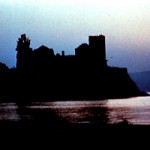The sixteenth annual lecture in South Slavic Linguistics presented at The Ohio State University to commemorate Professor Kenneth E. Naylor (1935-1992) was given by Professor Olga Mladenova (University of Calgary) on “The Rise of Modern Bulgarian Literacy in the Seventeenth Century: New Facts and Interpretations,” Friday, March 22, 2013, in the Campus Reading Room on the 11th floor of Thompson Library.

Brian D. Joseph, Kenneth E. Naylor Professor of South Slavic Linguistics, and Olga Mladenova, 16th Annual Kenneth E. Naylor Memorial Lecturer on the 11th Floor, Thompson Library at The Ohio State University
Professor Brian D. Joseph (OSU Linguistics), who has held the “Kenneth E. Naylor Professorship of South Slavic Linguistics” since his investiture in 1997, opened the event with a brief account of Dr. Naylor and his contributions to OSU, to scholarship, and to the scholarly community, as well as a history of the professorship and the lecture series, and other initiatives funded by the professorship.
The lecture was well attended and Professor Mladenova’s account of her work with Bulgarian damanskini elicted a number of thought-provoking comments from the audience. Colleagues of Dr. Naylor present included professors emeriti David F. Robinson (OSU Slavic) and Carole Rogel (OSU History).
A reception of exceptional food from Milo’s Catering was organized by Karen Nielsen of the OSU Department of Slavic and East European Languages and Cultures. Ms. Nielsen also arranged a display of scrapbooks and a photo-montage documenting the past lectures. Shannon Niemeyer, events coordinator for the OSU Libraries, orchestrated a hospitable arrangement and atmosphere for what was judged a “superb” venue.
A wooden grid display case, provided thanks to the efforts of OSU Libraries’ Cheryl Mason-Middleton and Mark Moziejko, effectively exhibited publications of Drs. Joseph, Naylor, and Mladenova, as well as the first five Naylor Memorial lectures. Lauren Ressue, RCMSS GA, assisted. Immense gratitude to Michelle Drobik of the University Archives at OSU for photo images of Professor Naylor from 1975, 1976, and 1981.

Professor Brian D. Joseph with the 16th Annual Kenneth E. Naylor Memorial Lecture publication display
Items on display (see photo) include photographs of Professor Naylor (1981 and 1975), Olga Mladenova’s Definiteness in Bulgarian: Modelling the Processes of Language Change (Trends in Linguistics: Studies and Monographs 182), Berlin: Mouton de Gruyter, 2007; Brian D. Joseph’s The Synchrony and Diachrony of the Balkan Infinitive: A study in areal, general, and historical linguistics (Cambridge Studies in Linguistics Supplemental Volume, 2009 reprint); Mladenova’s Russian Second-Language Textbooks and Identity in the Universe of Discourse: A Contribution to Macropragmatics (Slavistische Beiträge 432), München: Sagner, 2004; and a color printout of the cover of her Grapes and Wine In the Balkans: An Ethno-Linguistic Study (Balkanologische Veröffentlichungen 32), Wiesbaden: Harrassowitz Verlag, 1998, flanked by the first and second Naylor Memorial Lectures, Linguistic Emblems and Emblematic Languages: On Language as Flag in the Balkans by Victor A. Friedman (1998), and Ronelle Alexander’s In Honor of Diversity: the Linguistic Resources of the Balkans (1999), respectively.
Volumes 1-6 of Balkanistica: A Journal of Southeast European Studies (1974-1980), and Folia Slavica 1.1 (1977) edited by Kenneth E. Naylor, were framed by published versions of the third, fourth, and fifth Naylor Memorial Lectures: What Is a Standard Language Good For, and Who Gets to Have One? by Wayles Browne (2000), The Balkan Linguistic League, “Orientalism,” and Linguistic Typology by Howard I. Aronson (2007), and Minority Language Rights in Primary Education: A Century of Change in the Balkans by Christina E. Kramer (2010).



